初中英语语法非谓语动词复习课件(60张ppt)
文档属性
| 名称 | 初中英语语法非谓语动词复习课件(60张ppt) |  | |
| 格式 | ppt | ||
| 文件大小 | 1.0MB | ||
| 资源类型 | 教案 | ||
| 版本资源 | 通用版 | ||
| 科目 | 英语 | ||
| 更新时间 | 2021-11-18 11:40:43 | ||
图片预览

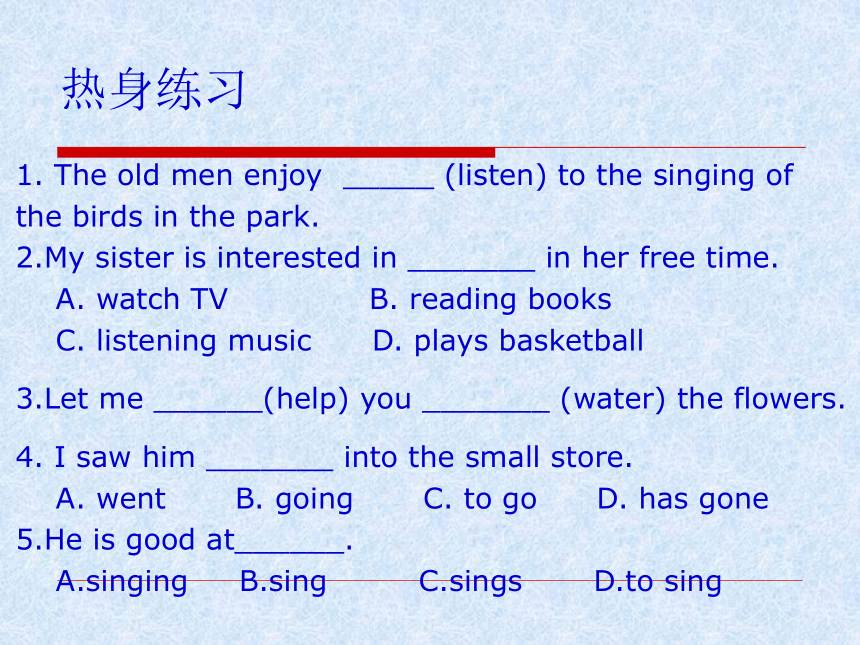


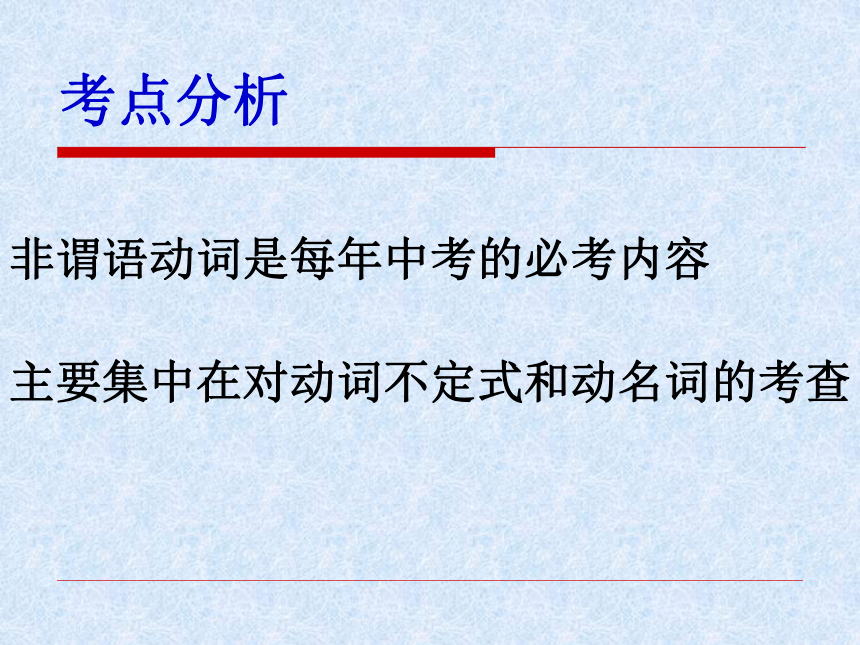



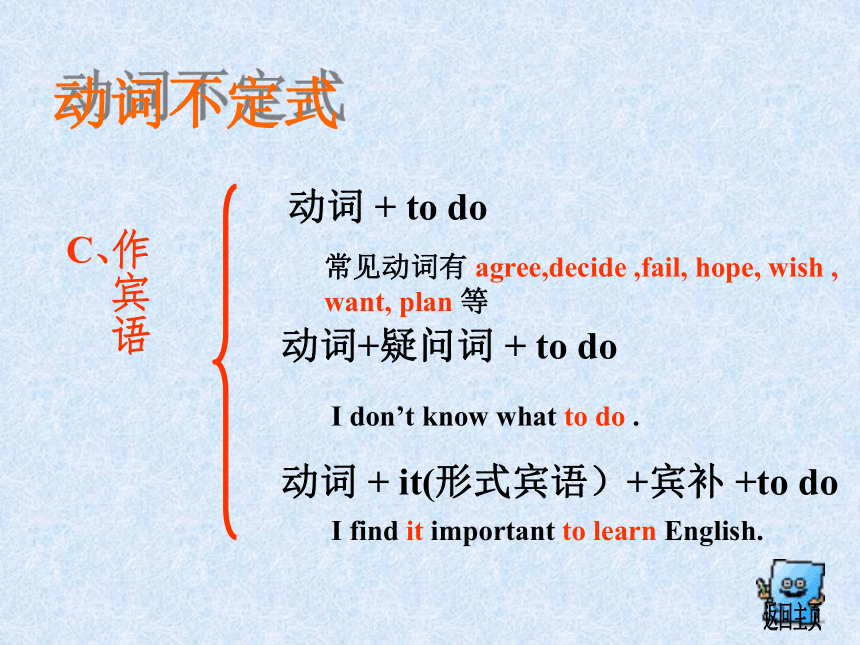
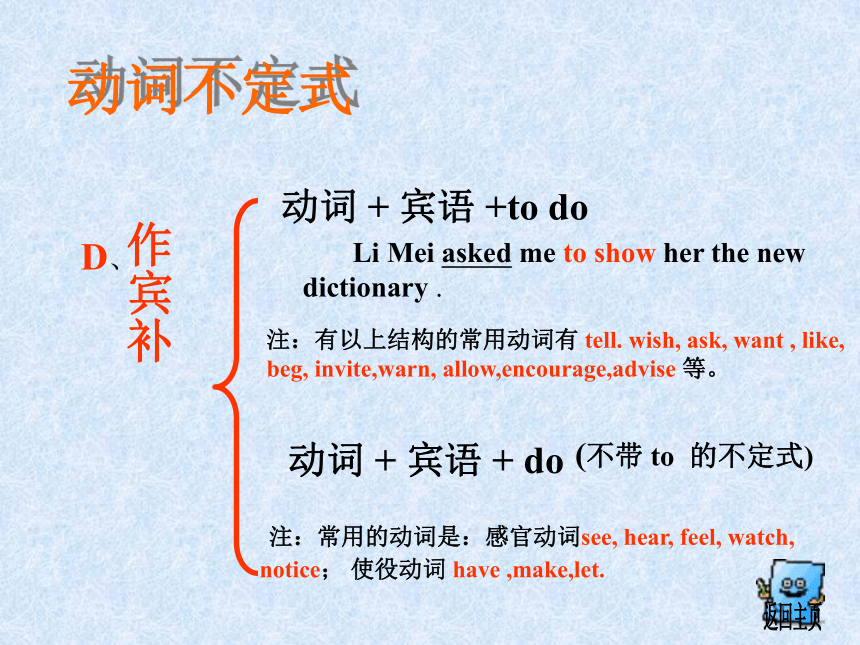
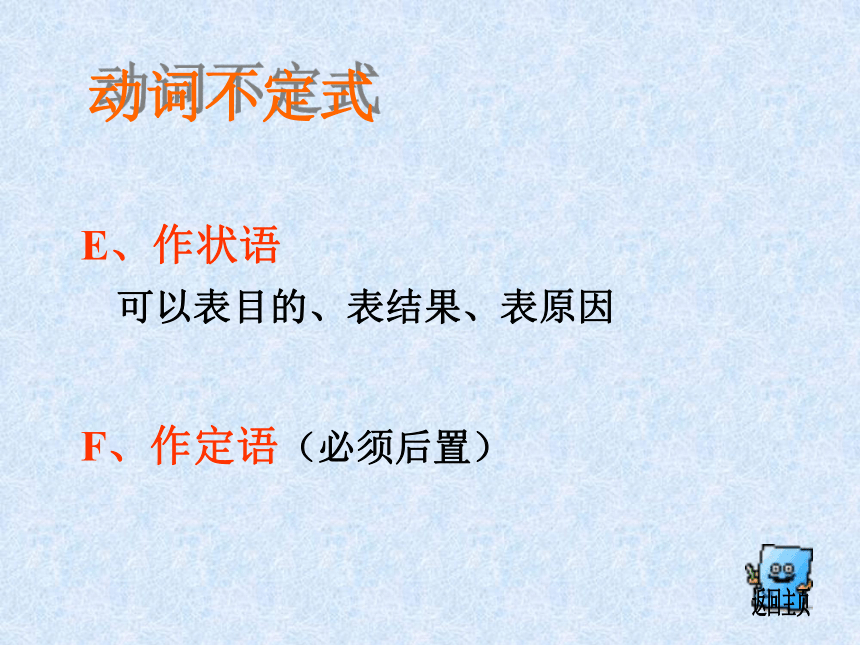
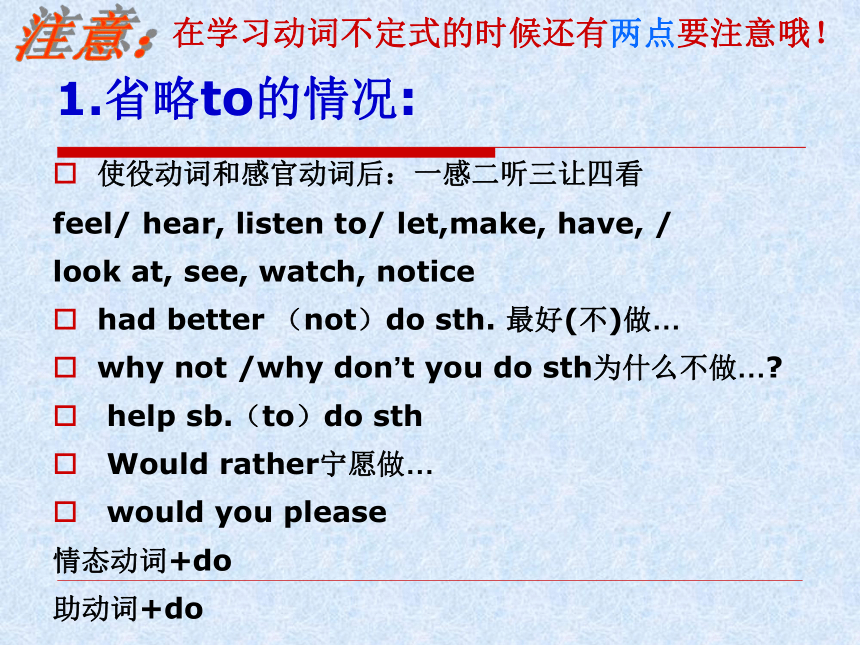
文档简介
(共60张PPT)
热身练习
1. The old men enjoy _____ (listen) to the singing of the birds in the park.
2.My sister is interested in _______ in her free time.
A. watch TV B. reading books
C. listening music D. plays basketball
3.Let me ______(help) you _______ (water) the flowers.
4. I saw him _______ into the small store. A. went B. going C. to go D. has gone
5.He is good at______.
A.singing B.sing C.sings D.to sing
非谓语动词的概念
在句子中充当除谓语以外的句子成分的动词形式叫做非谓语动词
它不受人称和数的限制
非谓语动词
动词不定式
动名词
分词
非谓语动词是每年中考的必考内容
主要集中在对动词不定式和动名词的考查
考点分析
基本形式及特点
用法
注意事项
动词不定式
(1)基本形式:
to+动词原形 (在某些情况下可以不带 to)
(2)特点 :
A .没有人称和数的变化
C . 有时态和语态的变化(被动语态的形式为 to be + 动词过去分词)
B . 可以有自己的宾语和状语
动词不定式
(3) 用法 :
A、作主语,如
To learn a foreign language is not easy . = It’s not easy to learn a foreign language.
注意:不定式短语作主语如果太长,常用IT作形式主语,将不定式后置。除动词be外, 动词take,cost也常用于上述结构。
B、作表语,如
The important thing is to finish the work on time .
动词不定式
作宾语
C、
动词 + to do
动词+疑问词 + to do
动词 + it(形式宾语)+宾补 +to do
常见动词有 agree,decide ,fail, hope, wish , want, plan 等
I don’t know what to do .
I find it important to learn English.
动词不定式
D、
作宾补
动词 + 宾语 +to do
动词 + 宾语 + do
Li Mei asked me to show her the new dictionary .
注:有以上结构的常用动词有 tell. wish, ask, want , like, beg, invite,warn, allow,encourage,advise 等。
(不带 to 的不定式)
注:常用的动词是:感官动词see, hear, feel, watch, notice; 使役动词 have ,make,let.
E、作状语
可以表目的、表结果、表原因
F、作定语(必须后置)
动词不定式
1.省略to的情况:
使役动词和感官动词后:一感二听三让四看
feel/ hear, listen to/ let,make, have, /
look at, see, watch, notice
had better (not)do sth. 最好(不)做…
why not /why don’t you do sth为什么不做…
help sb.(to)do sth
Would rather宁愿做…
would you please
情态动词+do
助动词+do
在学习动词不定式的时候还有两点要注意哦!
I always saw her play violin .
He was made to work 12hours a day.
2、动词不定式的否定形式为:
not + to do
Mr.Smith asked the boy ___________(not play) this kind of game.
not to play
Please have him __________(not do) so much housework.
not do
只能接不定式作宾语的动词口诀:
决定想做计划需要同意,能做被用来做的事
迫不及待下决心做过去常常未能做的事
决定想做计划需要同意,能做被用来做的事
decide to do sth. 决定做某事
want ∕ would like to do sth. 想做某事
plan to do sth. 计划做某
need to do sth. 需要做某事
agree to do sth. 同意做某事
afford to do 能做某事
be used to do 被用来做
迫不及待下决心做过去常常未能做的事
can’t wait to do 迫不及待地要做某事
make up one’s mind to do 下决心做某事
used to do 过去常常做某事
fail to do 未能做某事
接不定式作宾语补足语的动词口诀:
请求与命令
想要邀请期待鼓励与建议
答应告诫允许提醒和帮助
请求与命令
ask sb. to do sth. 请求某人做某事
tell sb. to do sth. 命令某人做某事
想要邀请期待鼓励与建议
want sb. to do sth. 想要某人做某事
invite sb. to do sth. 邀请某人做某事
expect sb. to do sth. 期待某人做某事
encourage sb. to do sth. 鼓励某人做某事
advise sb. to do sth. 建议某人做某事
答应告诫允许提醒和帮助
promise sb. to do 答应某人做某事
warn sb. not to do sth. 告诫某人做某事
allow sb. to do sth. 允许某人做某事
remind sb. to do sth. 提醒某人做某事
help sb. (to) do sth. 帮助某人做某事
区分下列词组:
see sb. doing/ do sth.
hear sb. doing/ do sth.
watch sb. doing/ do sth.
notice sb. doing/ do sth.
感官动词 see, watch, look at, notice, hear, listen to, feel
+ do表示动作的完整性,
+doing 表示动作的进行性。
注意:被动语态中不能省去to。
牛刀小试
1. My mother often asks me _____ some cleaning on Sundays
A do B. does C. did D. to do
2. –Do you often hear John _____in his room
– Listen! Now we can hear him ____ in his room .
A.sing , to sing B. sing, sing
C. sing , singing D. to sing , singing
3. I watched her ______ in the next room last night .
A.dancing B. to dance C. dances D. dance
4.Let’s ______swimming after the exam .
A.go B. goes C. to go D. went
5. You’d better _______a bus .
A.to catch B. catch C. catches D. catching
特殊词精讲:
to do doing
remember
forget (do在后) 要做 (do在前)做过
stop
go on (两个字)两件事 (一个字)一件事
like
hate
love
一次性
长期
try 尽力做 尝试做
start
begin 一样 一样
stop doing/to do
stop to do 停下来去做另一件事,
stop doing 停止正在做的某事。
Eg:
他们停下来吸烟。 They stop to smoke.
我必须戒烟了 I must stop smoking.
forget to do 忘记要去做某事,
forget doing 忘记做过某事。
Eg:
办公室的灯还在亮着,他忘记关了。(没有做关灯的动作
The light in the office is still on.
He forgot to turn it off.
他忘记他已经关了灯了。(已做过关灯的动作)
He forgot turning the light off.
forget doing/to do
remember doing/to do
remember to do 记得去做某事
remember doing 记得做过某事
记着放学后去趟邮局。
Remember to go to the post office after school.
你不记得以前见过那个人吗
Don't you remember seeing the man before
go on doing/to do
go on to do做了一件事后,接着做另一件事,
go on doing 继续做原来做的事。
Eg:
做完数学后,他接着去做物理。
After he had finished his maths,he went on to do his physics.
做完这个练习后,接着做其他的练习
Go on doing other exercises after you have finished this one.
try doing/ to do sth.
try to do sth. 努力, 尽力做某事
Although maths is difficult, I will try to study it .
try doing sth. 试着做某事
The machine couldn’t work. Let’s try repairing it.
基本形式及特征
用法
注意
基本形式
特点
动词原形 + ing
1、具有名词、动词的一些特征。
2、有时态和语态的变化
用法
1、作主语
Picking apples is much better than having classes.
2、作宾语
(1)只能接动名词做宾语的动词有miss, finish, mind, keep, practice, enjoy, 等。
(2)既可接动词不定式又可接动名词作宾语的动词有两类:
意义区分不大:begin , start, like, love, hate, prefer 等。
意义不同:remember, forget, stop, go on , try 等
3、作表语
His favorite sport is playing basketball .
4、作定语
shopping basketball finishing line
1、动名词的 复合结构为:
名词所有格
形容词性物主代词
+ 动名词
Do you mind _________the window
me to open b. I open
c.my opening d. me opening
c
2、动名词的习惯用语:
a. It’s no use doing sth.
b. can’t help doing sth.
c. feel like doing sth.
d. be busy doing sth.
e. No doing
动词+doing
介词+doing
doing
动名词
只能接-ing作宾语的动词口诀:
喜欢花费忙着想象忍不住想要结束练习 错过建议保持介意值得考虑 (押韵)
喜欢花费忙着想象忍不住想要结束练习
enjoy doing sth. 喜欢做某事
spend...doing sth. 花费…做某事
be busy doing sth. 忙于做…
imagine sb. doing sth. 想象…做某事
can't help doing sth. 忍不住做某事
feel like doing sth. 想要做某事
finish doing sth. 完成做某事
practice doing sth. 练习做某事
miss doing sth. 错过做某事
suggest doing sth. 建议做某事
keep (on) doing sth. 保持(继续)做某事
mind doing sth. 介意做某事
be worth doing sth. 值得做某事
consider doing sth. 考虑做某事
错过建议保持介意值得考虑
介词+doing
常考介词:
at, in, on
of, off, for, from
up, about, without
to 等等
be good at doing sth 擅长做某事
be interested in doing sth. 对做某事感兴趣
insist on doing 坚持做某事
be used for doing sth. 被用来做某事
thank sb. for doing sth. 谢谢某人做某事
be tired of doing sth. 厌烦做某事
be afraid of doing sth. 害怕做某事
put off doing 推迟做某事
stop sb. from doing sth. 阻止某人做某事
give up doing sth. 放弃做某事
without doing sth. 没有做某事
think about doing sth. 考虑做某事
What ∕ How about doing 做某事怎么样
此to 非彼to
look forward to doing sth. (盼望)
pay attention to doing sth. (注意)
be used to doing sth. (习惯于)
prefer doing sth to doing sth.(更喜欢)
devote to doing sth (致力于)
make a contribution to doing (做贡献)
小试牛刀
1. Now more and more people are busy_____ about the Internet.
A. learn B. to learn C. learning D. learned
2.-It's too hot. Would you mind _____the door
-______. Please do it.
A. to open; OK B. opening; Certainly not
C. opening; Of course D. to open; Good idea
3. No matter how hard it is, we'll keep_____until we make it.
A. failed B. failing C. tried D. trying
4. -Are you enjoying_____in Ningbo
-Yes, we are. Very much.
A. to live B. living C. lives D. lived
5. We couldn’t help _____(laugh) after we heard the funny story
A. to laugh B. living C. lives D. lived
基本形式:动词原形+ ing
基本形式: 规则动词加ed 或不规则动词的过去分词
developing country
developed country
拓展精练
1.Martin looks so well. We’ve never seen him ____ so well before.
A. is looked B. is looking C. to look D. look
2.My father has decided ______ because smoking is bad for his health.
A. to stop to smoke B. to stop smoking
C. stopping smoking D. stop to smoke
3 It is kind ___ me to carry these books.
A. of you helping B. for you to help C. of you to help D. for you helping
4 —Would you like ______ some bread or biscuits
—No thanks. I don’t feel like anything now.
A. to have, eating B. to have, to eat C. having, to eat D. having, eating
5. — Do you remember me, Tom
— Ah, yes, I remembered _____ you in JUSCO last year.
A. see B. sees C. to see D. seeing
1.I’ve work with children before, so I know what ___ in my job.
. expected . to expect . to be expecting . expects
2.The patient was warned ____ oily food after the operation.
. to eat not . eating not . not to eat . not eat
. 3.The speaker raised his voice but still couldn’t make himself____ .
.hear . to hear . hearing . heard
4.--I usually go there by train.
--Why not ____ by boat for a change
. to try going . trying to go . to try and go . try going
what/how 等后面只跟不定式.此结构为宾语从句的省略形式.当宾语从句的谓语动词是want to do sth 或should do sth 时,而宾语从句的主语又是主句的主语时,可将宾语从句省略成what/which/who...to do,(此形式中do与what等是动宾形式,但不用to be done 形式)或how/where/why...to do sth.
make oneself heard是固定用法,heard在这儿是非谓语。make后面这部分不是一个句子,也不是从句,不需要加个be做谓语
7. Rather than ___ on a crowded bus, he always prefers ____ a bicycle.
. ride; ride . riding; ride . ride; to ride . to ride; riding
6. She can’t help ____ the house because she’s busy making a cake.
. to clean . cleaning . cleaned . being cleaned
5. How about the two of us ____ a walk down the garden
. to take . take . taking . to be taking
8.He gave us some advice on how____ English.
.learning . learned . to learn . learn
12. It was so cold that they kept the fire ________all night.
. to burn . burn . burning . burned
11.She reached the top of the hill and stopped_____on a big rock by the side of the path.
.to have rested .resting .to rest .rest
9.Is______necessary to change trains at Beijing
. this . that . it . he
10.Our father often told us in the past that _____is believing.
.to see .seeing .see .to be seen
15.Tom is the first _____ to school.
. get . to get .getting . got
14.They knew her very well.They had seen her____up from
childhood.
.grow .grew .was growing .to grow
13.I’m thirsty. Would you please give me something________.
.drunk .to drink .to be drunk .for drinking
16.Would you mind ____________ your radio a little A.turn off B.turning off C.to turn down D.turning down 17.Don’t you remember _____________ A.seeing the man before B.saw the man before C.to see the man before D.to have seen the man before
18.People couldn’t help ____________ the foolish emperor in the procession. A.laugh at B.to laugh at C.laughing at D.laughing on 19.Do you remember ____________ me at a party last year A.meet B.to meet C.meeting D.met 20.Go on ____________ the other exercise after you have finished this one. A.to do B.doing C.with D.to be doing
. I didn’t spend al the money _______(buy) the books.
2. Do you have anything ________(say) at the meeting
3. Yesterday I saw a wallet ________(lie) on the ground .
4.The man ran out ________(see) what was wrong .
5. She was often heard _________(sing) in English.
6. Stop ________(read), please.I’ve something to tell you .
7. The boy _______(call) Li Hua in the room is his brother.
buying
to say
lying
to see
to sing
reading
called
Homework
1.We are interested in _________ to swim.
A. study B. studying C. learn D. learning
2.My grandfather wants _____around the world because he enjoys _____new places.
A. traveling , seeing B. to travel , to see
C. to travel, seeing D. traveling ,to see
3. Jack gives me a piece of paper___. A. to write B. to write on C. to write at D. to write in
4. Let’s make a fire _____ ourselves up.
A. to warm B. warming C. warm D. warmed
5.When I was walking in the field, I saw a plane ___over my head. A. flew B. flies C. flying D. fling
热身练习
1. The old men enjoy _____ (listen) to the singing of the birds in the park.
2.My sister is interested in _______ in her free time.
A. watch TV B. reading books
C. listening music D. plays basketball
3.Let me ______(help) you _______ (water) the flowers.
4. I saw him _______ into the small store. A. went B. going C. to go D. has gone
5.He is good at______.
A.singing B.sing C.sings D.to sing
非谓语动词的概念
在句子中充当除谓语以外的句子成分的动词形式叫做非谓语动词
它不受人称和数的限制
非谓语动词
动词不定式
动名词
分词
非谓语动词是每年中考的必考内容
主要集中在对动词不定式和动名词的考查
考点分析
基本形式及特点
用法
注意事项
动词不定式
(1)基本形式:
to+动词原形 (在某些情况下可以不带 to)
(2)特点 :
A .没有人称和数的变化
C . 有时态和语态的变化(被动语态的形式为 to be + 动词过去分词)
B . 可以有自己的宾语和状语
动词不定式
(3) 用法 :
A、作主语,如
To learn a foreign language is not easy . = It’s not easy to learn a foreign language.
注意:不定式短语作主语如果太长,常用IT作形式主语,将不定式后置。除动词be外, 动词take,cost也常用于上述结构。
B、作表语,如
The important thing is to finish the work on time .
动词不定式
作宾语
C、
动词 + to do
动词+疑问词 + to do
动词 + it(形式宾语)+宾补 +to do
常见动词有 agree,decide ,fail, hope, wish , want, plan 等
I don’t know what to do .
I find it important to learn English.
动词不定式
D、
作宾补
动词 + 宾语 +to do
动词 + 宾语 + do
Li Mei asked me to show her the new dictionary .
注:有以上结构的常用动词有 tell. wish, ask, want , like, beg, invite,warn, allow,encourage,advise 等。
(不带 to 的不定式)
注:常用的动词是:感官动词see, hear, feel, watch, notice; 使役动词 have ,make,let.
E、作状语
可以表目的、表结果、表原因
F、作定语(必须后置)
动词不定式
1.省略to的情况:
使役动词和感官动词后:一感二听三让四看
feel/ hear, listen to/ let,make, have, /
look at, see, watch, notice
had better (not)do sth. 最好(不)做…
why not /why don’t you do sth为什么不做…
help sb.(to)do sth
Would rather宁愿做…
would you please
情态动词+do
助动词+do
在学习动词不定式的时候还有两点要注意哦!
I always saw her play violin .
He was made to work 12hours a day.
2、动词不定式的否定形式为:
not + to do
Mr.Smith asked the boy ___________(not play) this kind of game.
not to play
Please have him __________(not do) so much housework.
not do
只能接不定式作宾语的动词口诀:
决定想做计划需要同意,能做被用来做的事
迫不及待下决心做过去常常未能做的事
决定想做计划需要同意,能做被用来做的事
decide to do sth. 决定做某事
want ∕ would like to do sth. 想做某事
plan to do sth. 计划做某
need to do sth. 需要做某事
agree to do sth. 同意做某事
afford to do 能做某事
be used to do 被用来做
迫不及待下决心做过去常常未能做的事
can’t wait to do 迫不及待地要做某事
make up one’s mind to do 下决心做某事
used to do 过去常常做某事
fail to do 未能做某事
接不定式作宾语补足语的动词口诀:
请求与命令
想要邀请期待鼓励与建议
答应告诫允许提醒和帮助
请求与命令
ask sb. to do sth. 请求某人做某事
tell sb. to do sth. 命令某人做某事
想要邀请期待鼓励与建议
want sb. to do sth. 想要某人做某事
invite sb. to do sth. 邀请某人做某事
expect sb. to do sth. 期待某人做某事
encourage sb. to do sth. 鼓励某人做某事
advise sb. to do sth. 建议某人做某事
答应告诫允许提醒和帮助
promise sb. to do 答应某人做某事
warn sb. not to do sth. 告诫某人做某事
allow sb. to do sth. 允许某人做某事
remind sb. to do sth. 提醒某人做某事
help sb. (to) do sth. 帮助某人做某事
区分下列词组:
see sb. doing/ do sth.
hear sb. doing/ do sth.
watch sb. doing/ do sth.
notice sb. doing/ do sth.
感官动词 see, watch, look at, notice, hear, listen to, feel
+ do表示动作的完整性,
+doing 表示动作的进行性。
注意:被动语态中不能省去to。
牛刀小试
1. My mother often asks me _____ some cleaning on Sundays
A do B. does C. did D. to do
2. –Do you often hear John _____in his room
– Listen! Now we can hear him ____ in his room .
A.sing , to sing B. sing, sing
C. sing , singing D. to sing , singing
3. I watched her ______ in the next room last night .
A.dancing B. to dance C. dances D. dance
4.Let’s ______swimming after the exam .
A.go B. goes C. to go D. went
5. You’d better _______a bus .
A.to catch B. catch C. catches D. catching
特殊词精讲:
to do doing
remember
forget (do在后) 要做 (do在前)做过
stop
go on (两个字)两件事 (一个字)一件事
like
hate
love
一次性
长期
try 尽力做 尝试做
start
begin 一样 一样
stop doing/to do
stop to do 停下来去做另一件事,
stop doing 停止正在做的某事。
Eg:
他们停下来吸烟。 They stop to smoke.
我必须戒烟了 I must stop smoking.
forget to do 忘记要去做某事,
forget doing 忘记做过某事。
Eg:
办公室的灯还在亮着,他忘记关了。(没有做关灯的动作
The light in the office is still on.
He forgot to turn it off.
他忘记他已经关了灯了。(已做过关灯的动作)
He forgot turning the light off.
forget doing/to do
remember doing/to do
remember to do 记得去做某事
remember doing 记得做过某事
记着放学后去趟邮局。
Remember to go to the post office after school.
你不记得以前见过那个人吗
Don't you remember seeing the man before
go on doing/to do
go on to do做了一件事后,接着做另一件事,
go on doing 继续做原来做的事。
Eg:
做完数学后,他接着去做物理。
After he had finished his maths,he went on to do his physics.
做完这个练习后,接着做其他的练习
Go on doing other exercises after you have finished this one.
try doing/ to do sth.
try to do sth. 努力, 尽力做某事
Although maths is difficult, I will try to study it .
try doing sth. 试着做某事
The machine couldn’t work. Let’s try repairing it.
基本形式及特征
用法
注意
基本形式
特点
动词原形 + ing
1、具有名词、动词的一些特征。
2、有时态和语态的变化
用法
1、作主语
Picking apples is much better than having classes.
2、作宾语
(1)只能接动名词做宾语的动词有miss, finish, mind, keep, practice, enjoy, 等。
(2)既可接动词不定式又可接动名词作宾语的动词有两类:
意义区分不大:begin , start, like, love, hate, prefer 等。
意义不同:remember, forget, stop, go on , try 等
3、作表语
His favorite sport is playing basketball .
4、作定语
shopping basketball finishing line
1、动名词的 复合结构为:
名词所有格
形容词性物主代词
+ 动名词
Do you mind _________the window
me to open b. I open
c.my opening d. me opening
c
2、动名词的习惯用语:
a. It’s no use doing sth.
b. can’t help doing sth.
c. feel like doing sth.
d. be busy doing sth.
e. No doing
动词+doing
介词+doing
doing
动名词
只能接-ing作宾语的动词口诀:
喜欢花费忙着想象忍不住想要结束练习 错过建议保持介意值得考虑 (押韵)
喜欢花费忙着想象忍不住想要结束练习
enjoy doing sth. 喜欢做某事
spend...doing sth. 花费…做某事
be busy doing sth. 忙于做…
imagine sb. doing sth. 想象…做某事
can't help doing sth. 忍不住做某事
feel like doing sth. 想要做某事
finish doing sth. 完成做某事
practice doing sth. 练习做某事
miss doing sth. 错过做某事
suggest doing sth. 建议做某事
keep (on) doing sth. 保持(继续)做某事
mind doing sth. 介意做某事
be worth doing sth. 值得做某事
consider doing sth. 考虑做某事
错过建议保持介意值得考虑
介词+doing
常考介词:
at, in, on
of, off, for, from
up, about, without
to 等等
be good at doing sth 擅长做某事
be interested in doing sth. 对做某事感兴趣
insist on doing 坚持做某事
be used for doing sth. 被用来做某事
thank sb. for doing sth. 谢谢某人做某事
be tired of doing sth. 厌烦做某事
be afraid of doing sth. 害怕做某事
put off doing 推迟做某事
stop sb. from doing sth. 阻止某人做某事
give up doing sth. 放弃做某事
without doing sth. 没有做某事
think about doing sth. 考虑做某事
What ∕ How about doing 做某事怎么样
此to 非彼to
look forward to doing sth. (盼望)
pay attention to doing sth. (注意)
be used to doing sth. (习惯于)
prefer doing sth to doing sth.(更喜欢)
devote to doing sth (致力于)
make a contribution to doing (做贡献)
小试牛刀
1. Now more and more people are busy_____ about the Internet.
A. learn B. to learn C. learning D. learned
2.-It's too hot. Would you mind _____the door
-______. Please do it.
A. to open; OK B. opening; Certainly not
C. opening; Of course D. to open; Good idea
3. No matter how hard it is, we'll keep_____until we make it.
A. failed B. failing C. tried D. trying
4. -Are you enjoying_____in Ningbo
-Yes, we are. Very much.
A. to live B. living C. lives D. lived
5. We couldn’t help _____(laugh) after we heard the funny story
A. to laugh B. living C. lives D. lived
基本形式:动词原形+ ing
基本形式: 规则动词加ed 或不规则动词的过去分词
developing country
developed country
拓展精练
1.Martin looks so well. We’ve never seen him ____ so well before.
A. is looked B. is looking C. to look D. look
2.My father has decided ______ because smoking is bad for his health.
A. to stop to smoke B. to stop smoking
C. stopping smoking D. stop to smoke
3 It is kind ___ me to carry these books.
A. of you helping B. for you to help C. of you to help D. for you helping
4 —Would you like ______ some bread or biscuits
—No thanks. I don’t feel like anything now.
A. to have, eating B. to have, to eat C. having, to eat D. having, eating
5. — Do you remember me, Tom
— Ah, yes, I remembered _____ you in JUSCO last year.
A. see B. sees C. to see D. seeing
1.I’ve work with children before, so I know what ___ in my job.
. expected . to expect . to be expecting . expects
2.The patient was warned ____ oily food after the operation.
. to eat not . eating not . not to eat . not eat
. 3.The speaker raised his voice but still couldn’t make himself____ .
.hear . to hear . hearing . heard
4.--I usually go there by train.
--Why not ____ by boat for a change
. to try going . trying to go . to try and go . try going
what/how 等后面只跟不定式.此结构为宾语从句的省略形式.当宾语从句的谓语动词是want to do sth 或should do sth 时,而宾语从句的主语又是主句的主语时,可将宾语从句省略成what/which/who...to do,(此形式中do与what等是动宾形式,但不用to be done 形式)或how/where/why...to do sth.
make oneself heard是固定用法,heard在这儿是非谓语。make后面这部分不是一个句子,也不是从句,不需要加个be做谓语
7. Rather than ___ on a crowded bus, he always prefers ____ a bicycle.
. ride; ride . riding; ride . ride; to ride . to ride; riding
6. She can’t help ____ the house because she’s busy making a cake.
. to clean . cleaning . cleaned . being cleaned
5. How about the two of us ____ a walk down the garden
. to take . take . taking . to be taking
8.He gave us some advice on how____ English.
.learning . learned . to learn . learn
12. It was so cold that they kept the fire ________all night.
. to burn . burn . burning . burned
11.She reached the top of the hill and stopped_____on a big rock by the side of the path.
.to have rested .resting .to rest .rest
9.Is______necessary to change trains at Beijing
. this . that . it . he
10.Our father often told us in the past that _____is believing.
.to see .seeing .see .to be seen
15.Tom is the first _____ to school.
. get . to get .getting . got
14.They knew her very well.They had seen her____up from
childhood.
.grow .grew .was growing .to grow
13.I’m thirsty. Would you please give me something________.
.drunk .to drink .to be drunk .for drinking
16.Would you mind ____________ your radio a little A.turn off B.turning off C.to turn down D.turning down 17.Don’t you remember _____________ A.seeing the man before B.saw the man before C.to see the man before D.to have seen the man before
18.People couldn’t help ____________ the foolish emperor in the procession. A.laugh at B.to laugh at C.laughing at D.laughing on 19.Do you remember ____________ me at a party last year A.meet B.to meet C.meeting D.met 20.Go on ____________ the other exercise after you have finished this one. A.to do B.doing C.with D.to be doing
. I didn’t spend al the money _______(buy) the books.
2. Do you have anything ________(say) at the meeting
3. Yesterday I saw a wallet ________(lie) on the ground .
4.The man ran out ________(see) what was wrong .
5. She was often heard _________(sing) in English.
6. Stop ________(read), please.I’ve something to tell you .
7. The boy _______(call) Li Hua in the room is his brother.
buying
to say
lying
to see
to sing
reading
called
Homework
1.We are interested in _________ to swim.
A. study B. studying C. learn D. learning
2.My grandfather wants _____around the world because he enjoys _____new places.
A. traveling , seeing B. to travel , to see
C. to travel, seeing D. traveling ,to see
3. Jack gives me a piece of paper___. A. to write B. to write on C. to write at D. to write in
4. Let’s make a fire _____ ourselves up.
A. to warm B. warming C. warm D. warmed
5.When I was walking in the field, I saw a plane ___over my head. A. flew B. flies C. flying D. fling
同课章节目录
- 词法
- 名词
- 动词和动词短语
- 动词语态
- 动词时态
- 助动词和情态动词
- 非谓语动词
- 冠词
- 代词
- 数词和量词
- 形容词副词及其比较等级
- 介词和介词短语
- 连词和感叹词
- 构词法
- 相似、相近词比较
- 句法
- 陈述句
- 一般疑问句和否定疑问句
- 特殊疑问句及选择疑问句
- 反意疑问句
- 存在句(There be句型)
- 宾语从句
- 定语从句
- 状语从句
- 主谓一致问题
- 简单句
- 并列句
- 复合句
- 主谓一致
- 主、表语从句
- 名词性从句
- 直接引语和间接引语
- 虚拟语气
- 感叹句
- 强调句
- 倒装句
- 祈使句
- 句子的成分
- 句子的分类
- 题型专区
- 单项选择部分
- 易错题
- 完形填空
- 阅读理解
- 词汇练习
- 听说训练
- 句型转换
- 补全对话
- 短文改错
- 翻译
- 书面表达
- 任务型阅读
- 语法填空
- 其他资料
